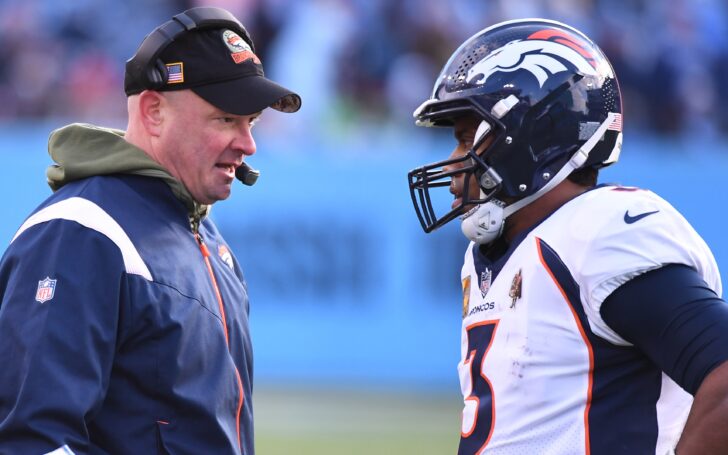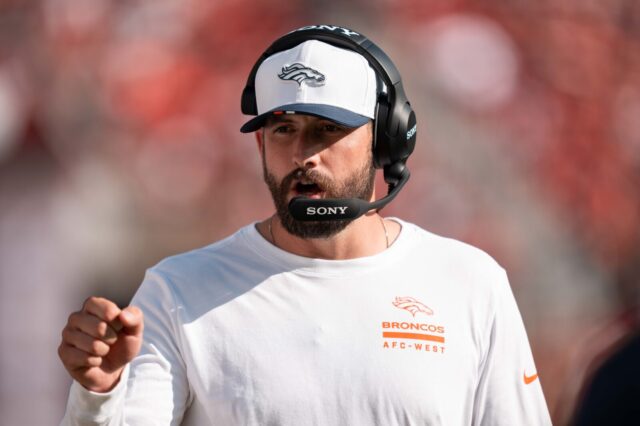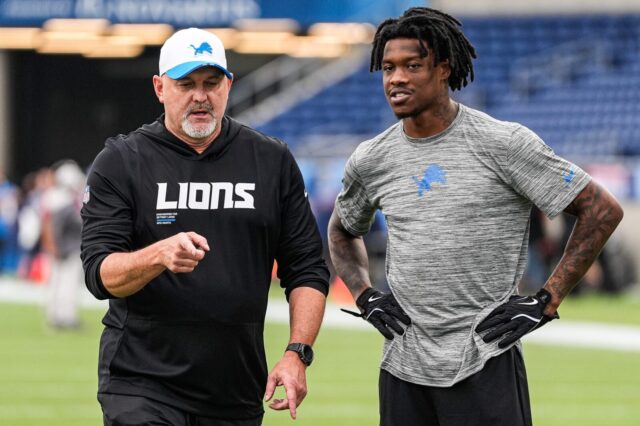The quarterback uniquely has a spotlight on him as the most important position in all American sports.
And for a guy like Russell Wilson — who’s constantly putting the spotlight on himself — it’s easy to see why Broncos fans and others around the country want to point the finger squarely at him.
Denver’s offense has been awful. And Wilson is certainly to blame. At least, partly.
Also partly to blame are Wilson’s receivers. Courtland Sutton and Jerry Jeudy aren’t playing to the level the team needs them to, and the team was tied through 8 weeks for most drops in the NFL. Plus, the Broncos had no tight end threat for half of the season until Greg Dulcich was activated and proved he’s a legitimate weapon.
Of course, the offensive line is also partly to blame for the Broncos blunders on offense. Even before there were injuries at every position, Denver’s line wasn’t protecting Wilson well enough, nor opening up holes for running backs.
The simple truth is: There’s no simple answer to why the Broncos are this bad. It’s complicated and many players are the reasons why.
And even if Wilson is most to blame as a player — which many would agree his is, as quarterback — head coach Nathaniel Hackett is even more to blame than his QB.
Why?
Coaches are supposed to tailor the offense to fit what their players’ strengths and weaknesses are. Beyond that, Hackett’s Broncos are the most-penalized team in the NFL. His team was even called for a delay of game on a kickoff because a player was eating a hot dog on the sideline. His decision-making in-game has been atrocious, from timeouts to challenges and more.
And most of all, Hackett’s play-calling has been so bad it’s beyond belief.
Play-calling
If the Broncos have any hope of improving this year, Hackett either 1. Needs to give up play-calling duties or 2. He must call more plays which play to the strength of not only Wilson, but all of Denver’s offensive players.
“And I gotta learn how to call plays for Russ, I gotta learn how to call plays for all the players,” Hackett admitted to Sports Illustrated at the end of October. “And we’ve been in the spotlight, all those things. And listen, we’ve got so much more that we have to do, so much more we have to correct. And there’s so much more room for being better.”
It’s hard to say what has been most frustrating about Hackett’s play-calling. The fact that it’s been easily predictable and lacked explosiveness, or the fact that he found out how to run the offense with Wilson and yet went away from it.
Wilson struggled mightily to start the season, and really, he’s still not playing near the level the Broncos need him to be. But a good coach would have, again, played to his struggling players’ strengths.
Six weeks into the year, Hackett finally figured that out. He needed to get Wilson going with easy, short passes. That worked against the Chargers, but he went away from it.
In London in week 8, Hackett went back to that short, quick passing game and Wilson flourished. The team scored three touchdowns on offense, which was their second-highest point output of the year.
And then, for some unknown reason, Hackett went away from that play-calling last week in the loss to Tennessee Titans. He should have doubled down on the quick passing game, not just to help Wilson get into a groove, but as the Broncos offensive linemen dropped like flies, too.
It should also be noted that Wilson flourished with a quick-passing game in Seattle, mixing in the deep passes here and there.
Red zone play-calling issues
Early in the season, he decided to have Wilson throw the football many times when the team was within 2 yards of the goal line.
In particular, Wilson threw a beautiful back-shoulder fade to Sutton for a touchdown against the Houston Texans. The team celebrated with elation. However, it was called back after review. What did Hackett do? Called the same, exact play, which was easily defended. He then, on 3rd and goal at the 1, called yet another throw instead of trying to run the ball in.
That was only one drive and a few boneheaded play-calls. There are many, many more.
Another notable, awful play-call was when the Broncos led the Indianapolis Colts 9-6, with 2:19 left on the clock, facing a 3rd and 4 from the 13 yard line. If Denver runs the ball there, they run the clock to the 2-minute warning. Then, they could have kicked a field goal to extend their lead and forced Indy to score a touchdown.
Instead, Hackett called a pass, which Wilson executed poorly, resulting in an interception in the end zone. Indianapolis ended up tying the game up with a field goal, and winning in overtime (Wilson notably missed a wide open KJ Hamler in the end zone in OT).
Leadership and identifying talent
Then, there’s leadership and identifying the best talents on the team. Hackett has been sub-par in both categories.
Many wondered why the Broncos were set to go with a 50-50 split between Javonte Williams and Melvin Gordon to begin the year, which is more-or-less what we saw. Williams should have been the featured back from Day 1.
And then, he benched Gordon in the middle of game with no explanation, only to start him again the next week.
Similarly, Albert Okwuegbunam was a young tight end Broncos Country was excited about. But after getting a little chance at the start of the season, he was benched without explanation. Luckily for Hackett, Dulcich has saved the day at tight end.
And then again last week, we saw Jalen Virgil come in and catch a 66-yard touchdown from Wilson. No offense to Kendall Hinton, but Virgil should have been playing in front of him all year long, and Hackett missed that, too.
Also of note, Hackett admitted on Monday that Wilson checked out of his original play call on that huge touchdown pass to Virgil.
Is Hackett or Wilson more to blame?
Currently, Denver’s offense is the worst in the NFL.
They are scoring a mere 14.6 points per game, which is dead-last, as is their red zone scoring percentage (35.0%). And on crucial third downs, Denver is 31st (28.5%).
This is Nathaniel Hackett’s offense. It’s his philosophy and, by all indications — from watching tape and looking at Seattle’s offense — this is not a blend of what Russ wants with Hackett’s desires on offense.
Wilson isn’t blameless. We’ve seen multiple times this year when he’s missed wide open receivers — like the Hamler one noted earlier — and it’s clear he’s not seeing the field the way he should be.
But when it comes down to every part of the offense — from play-calling to identifying talent and leadership — this awful offense is more Hackett’s fault than Wilson’s.
Now at 3-6 on the season, Denver’s a long shot to make the playoffs. Let’s see if Hackett can keep his job by coaching better over the next eight games, or if he’s ultimately let go after only one year.
As far as Wilson is concerned, let’s hold off full judgement of whether or not he can rebound from this down turn until after he has another play-caller.



